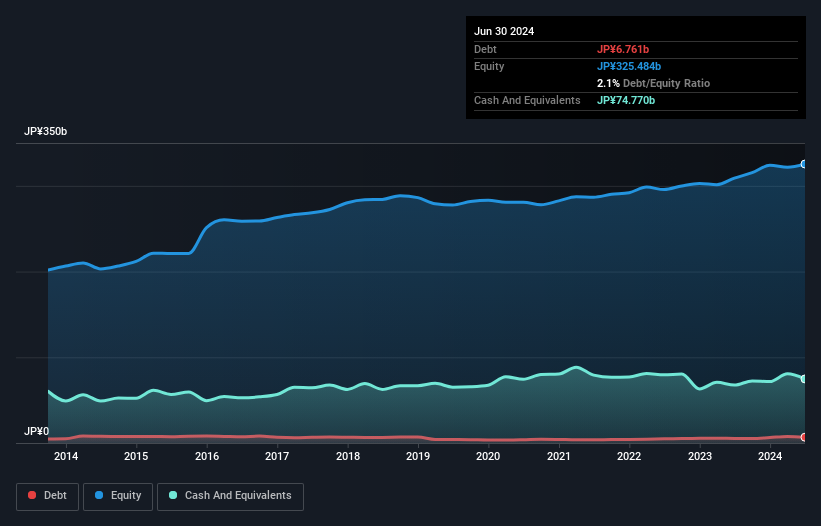Howard Marks put it nicely when he said that, rather than worrying about share price volatility, 'The possibility of permanent loss is the risk I worry about... and every practical investor I know worries about.' So it might be obvious that you need to consider debt, when you think about how risky any given stock is, because too much debt can sink a company. As with many other companies House Foods Group Inc. (TSE:2810) makes use of debt. But the real question is whether this debt is making the company risky.
When Is Debt Dangerous?
Debt is a tool to help businesses grow, but if a business is incapable of paying off its lenders, then it exists at their mercy. In the worst case scenario, a company can go bankrupt if it cannot pay its creditors. However, a more frequent (but still costly) occurrence is where a company must issue shares at bargain-basement prices, permanently diluting shareholders, just to shore up its balance sheet. Of course, the upside of debt is that it often represents cheap capital, especially when it replaces dilution in a company with the ability to reinvest at high rates of return. When we examine debt levels, we first consider both cash and debt levels, together.
See our latest analysis for House Foods Group
What Is House Foods Group's Net Debt?
As you can see below, at the end of June 2024, House Foods Group had JP¥6.76b of debt, up from JP¥5.29b a year ago. Click the image for more detail. However, its balance sheet shows it holds JP¥74.8b in cash, so it actually has JP¥68.0b net cash.

A Look At House Foods Group's Liabilities
According to the last reported balance sheet, House Foods Group had liabilities of JP¥57.9b due within 12 months, and liabilities of JP¥43.8b due beyond 12 months. On the other hand, it had cash of JP¥74.8b and JP¥53.6b worth of receivables due within a year. So it actually has JP¥26.7b more liquid assets than total liabilities.
This surplus suggests that House Foods Group has a conservative balance sheet, and could probably eliminate its debt without much difficulty. Succinctly put, House Foods Group boasts net cash, so it's fair to say it does not have a heavy debt load!
And we also note warmly that House Foods Group grew its EBIT by 17% last year, making its debt load easier to handle. There's no doubt that we learn most about debt from the balance sheet. But it is future earnings, more than anything, that will determine House Foods Group's ability to maintain a healthy balance sheet going forward. So if you're focused on the future you can check out this free report showing analyst profit forecasts.
But our final consideration is also important, because a company cannot pay debt with paper profits; it needs cold hard cash. While House Foods Group has net cash on its balance sheet, it's still worth taking a look at its ability to convert earnings before interest and tax (EBIT) to free cash flow, to help us understand how quickly it is building (or eroding) that cash balance. Looking at the most recent three years, House Foods Group recorded free cash flow of 39% of its EBIT, which is weaker than we'd expect. That's not great, when it comes to paying down debt.
Summing Up
While it is always sensible to investigate a company's debt, in this case House Foods Group has JP¥68.0b in net cash and a decent-looking balance sheet. And we liked the look of last year's 17% year-on-year EBIT growth. So is House Foods Group's debt a risk? It doesn't seem so to us. There's no doubt that we learn most about debt from the balance sheet. However, not all investment risk resides within the balance sheet - far from it. To that end, you should be aware of the 1 warning sign we've spotted with House Foods Group .
When all is said and done, sometimes its easier to focus on companies that don't even need debt. Readers can access a list of growth stocks with zero net debt 100% free, right now.
Valuation is complex, but we're here to simplify it.
Discover if House Foods Group might be undervalued or overvalued with our detailed analysis, featuring fair value estimates, potential risks, dividends, insider trades, and its financial condition.
Access Free AnalysisHave feedback on this article? Concerned about the content? Get in touch with us directly. Alternatively, email editorial-team (at) simplywallst.com.
This article by Simply Wall St is general in nature. We provide commentary based on historical data and analyst forecasts only using an unbiased methodology and our articles are not intended to be financial advice. It does not constitute a recommendation to buy or sell any stock, and does not take account of your objectives, or your financial situation. We aim to bring you long-term focused analysis driven by fundamental data. Note that our analysis may not factor in the latest price-sensitive company announcements or qualitative material. Simply Wall St has no position in any stocks mentioned.
About TSE:2810
House Foods Group
Engages in the manufacture, sale, import, and export of spices, seasonings, and processed foods in Japan and internationally.
Excellent balance sheet average dividend payer.
Market Insights
Community Narratives



